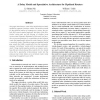22 search results - page 1 / 5 » On the Benefit of Supporting Virtual Channels in Wormhole Ro... |
SPAA
1996
ACM
13 years 9 months ago
1996
ACM
ICPP
1999
IEEE
13 years 9 months ago
1999
IEEE
A router design for torus networks that significantly reduces message latency over traditional wormhole routers is presented in this paper. This new router implements virtual cut-...
HPCA
2001
IEEE
14 years 5 months ago
2001
IEEE
This paper introduces a router delay model that accurately models key aspects of modern routers. The model accounts for the pipelined nature of contemporary routers, the specific ...
SC
1993
ACM
13 years 9 months ago
1993
ACM
A deadlock-free fully adaptive routing algorithm for 2D meshes which is optimal in the number of virtual channels required and in the number of restrictions placed on the use of t...
MAM
2011
13 years 7 days ago
2011
Asynchronous quasi-delay-insensitive (QDI) NoCs have several advantages over their clocked counterparts. Virtual channel (VC) is the most utilized flow control method in asynchro...

